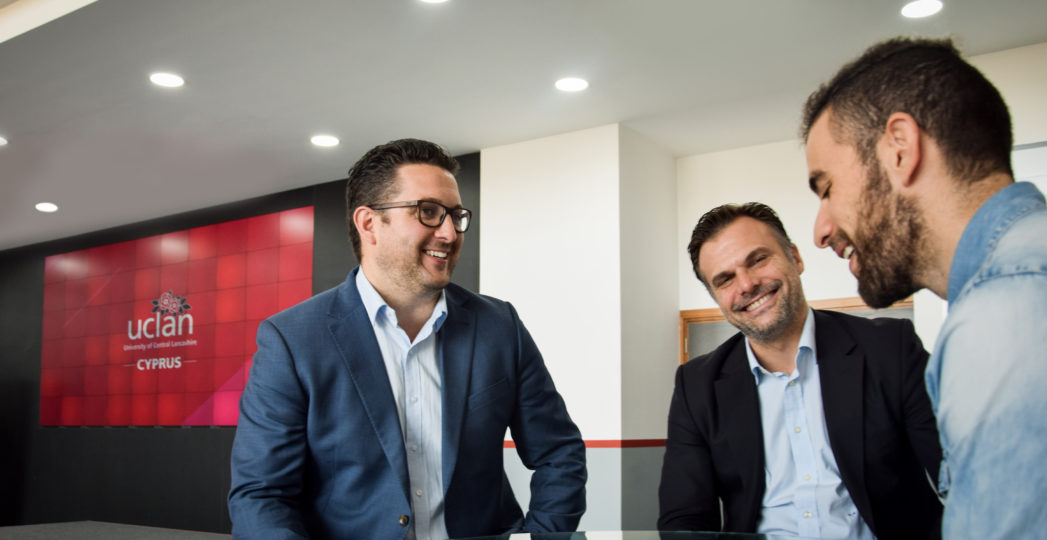Dr Robertson is a lecturer at Deakin Business School in Melbourne, Australia where he co-directs the Master of Business with specialisation in Sport Management. His research interests broadly look at social change, social responsibility and virtual reality in the sport industry.
Dr Robertson has been invited by Dr Christos Anagnostopoulos, assistant professor in Sport Business Management and Course Leader of MBA (Distance Learning) at UCLan Cyprus. Read below his interesting interview to UCLan Cyprus Senior Marketing Officer, Yiannis Zezos.
Yiannis (Y): Can you please introduce yourself?
Robertson (JR): My name is Dr Jonathan Robertson and I am a lecturer at Deakin Business School in Melbourne, Australia where I co-direct our Master of Business (Sport Management). My research interests broadly look at social change, social responsibility and virtual reality in the sport industry.
Y: What brings you to UCLan Cyprus?
JR: First
of all, allow me to openly thank Dr Loukas Glyptis (Head of School of Business
and Management) and Dr Christos Anagnostopoulos, for formally inviting me to visit
UCLan Cyprus as part of my 6-month sabbatical. I have been collaborating within
Dr Anagnostopoulos on different research fronts for around 5 years, and we are
both interested in improving the benefit society gets from sport in general.
Specifically, we are interested in helping national and international sport
organisations improve their governance and management of sport, which
increasingly includes a diverse range of issues from corruption and concussion,
to racism and collective bargaining etc. Ultimately, decisions on these issues come
back to the board members and senior managers of sport organisations. Our
research is interested in finding effective ways to help managers deal with
this increasingly complex environment and the impacts of their decisions on
society.
Y: You have come all the way from Australia to Cyprus, what are the main differences you have noticed between the sport systems?
JR: Well, I
have been here for only two weeks, but from what I have observed the two differences
are scale and the prominence of football here. As a country, Australia’s
population is roughly 25 times larger than the population of Cyprus. More
people equals more sport choices, more broadcasting and sponsorship
opportunities for a range of commercial sport leagues. In this sense, the
Australian sport system is quite diversified with four football types, cricket,
netball and basketball all having a wide televised presence and all
substantially developing pathways for women and girls. From what I have
observed the Cyprus sports system is much more centralized around football –with
an increasing focus on women’s development- and Olympic sports such as shooting,
sailing and tennis.
Y: And what about sport management education?
JR: The nature of higher education is changing around the world, as more and more students engage with forms of online education. The shift from face-to-face to online education is something that we both are facing as we look to specialize and develop distance learning opportunities. It has been really interesting to discuss with Christos, the innovative approaches to distance learning that UCLan Cyprus is adopting, and we are trying similar innovations for our students in Australia and internationally. At the same time, the expectations for on-campus students are also changing. Walking around UCLan Cyprus state-of-the art facilities and meeting with Christos’ colleagues, it is clear that there is an increasing emphasis and effort towards research-informed teaching and pedagogical practices. What struck me here was that one-day students could be literally in a classroom set up as a mock courtroom, witness box and areas for the prosecution and defense. The next day you could be learning from one of the key researchers in good governance enhancement as a result of the EU funded project, namely GReFORM, or measuring professional athletes’ performance through the latest sports science facilities in the lab. No doubt, Universities around the world – and from what I have seen, UCLan Cyprus included – are continually looking at ways to mix teaching, research, and industry engagement, and particularly ways to incorporate these innovations online.
Y: Finally, building on your research what do you think the needs for management graduates (in any industry, sport included) entering the workforce in the coming years?
JR: I encourage our management students to find a balance between a broad foundational knowledge of the current issues in sport management – because this is where my expertise lies -, and a distinctive set of skills from which they can bring value to a potential employer. It is important for students to understand that issues of sport governance, integrity, marketing, inclusion and performance all have a role to play in the sport industry. But it is equally important for students to develop a specified skill set, or profession, within this landscape such as digital marketing, ethics and integrity, sponsorship valuation, governance reform etc. In other words, we encourage a mix of generalist knowledge mixed with the ability to apply specific skills, tools, and knowledge that is of value to your employer.
Y: So what’s next then?
JR: Well, as you can see, we are here with Christos and the plan is to continue working on some specific research projects that aim towards using the power of sport to motivate, engage and inspire the youth, but also to mobilize key decision-makers towards more socially responsible practices in and around the wider sport domain. Of course, at the teaching front, knowledge transfer between the two Business Schools –especially for online education- is something that will keep us busy in the next years. There are many great cross-national opportunities to learn from as we continue to work together and develop our collaboration over the years to come.



